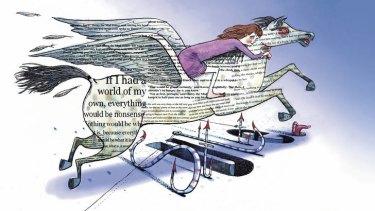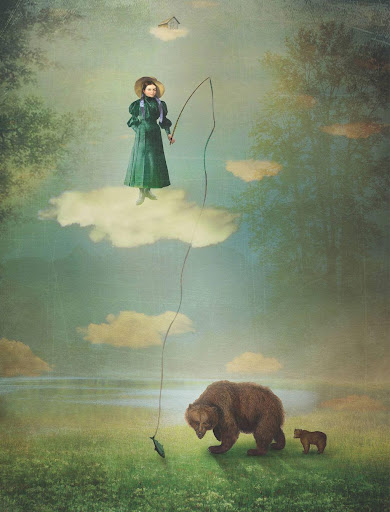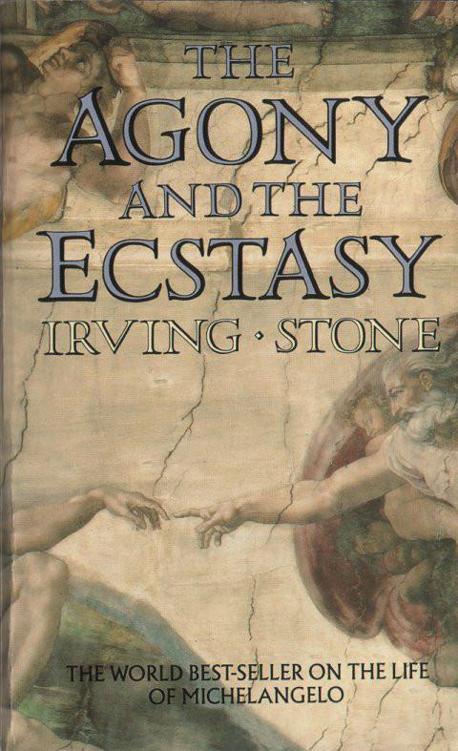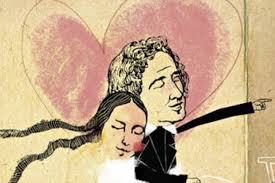Last week, teaching at a Winter Writers’ Retreat at Trinity College at Melbourne University, I asked my students how we could show the characteristic of shyness in a character in a story.
‘She could stutter,’ one suggested.
‘St-st-st-stuttering is a neurological dysfunction,’ I answered. ‘A failure of the synapses of the brain to properly connect thought and speech. It has nothing to do with shyness. I’m not shy, as I’m sure you’ve all noticed, but I’ve fought all my life with my st-st-st-st....’
And once again my stutter defeated me.
It always seems a cruel joke to me that the very word ‘stutter’ is difficult for a stutterer to pronounce. It is onomatopoeic, an imitation of the halting, repetitive sound that people with this speech dysfunction make. Interestingly, the word for ‘stutter’ in many languages mimics repeats this repetition. In Egypt, stuttering is called nit-nit, in Greek battos, in Latin blaterator, in Italian balbuzie, and in French bégayer.
I have struggled all my life with my stuttering.
Not to mention all my other speech impediments. I think I have every language disorder known to speech pathologists. I have real trouble with my ‘sh’ and ‘ch’ sounds, so that I say I am going a ‘shicken chop’ instead of a ‘chicken shop’.
My husband always said we could never buy a house in Warrawee as I’d have to pronounce it Wawwawee. Howwible, isn’t it?
The most exquisitely humorous for those that live with me are my spoonerisms, which is a modern term for what the Greeks called metathesis. It means the accidental transposition of letters or syllables, or in simpler terms, fuddling up your mucking words.
So I tell my sons to comb their teeth and brush their hair, and to eat their parrots and keys, and when I’m really cross, I say they have very mad banners.
I’m just glad that, so far, I’ve not said ‘hiss and leer’ instead of ‘listen here’, or ‘this is the pun fart’ instead of ‘this is the fun part’. I think my sons are just daying for the wait.
Spoonerisms are named after the Reverend William Archibald Spooner (1844-1930) who was Dean and Warden of New College in Oxford. Spooner was a small, half-blind albino, with a head too large for his body, and a mind too nimble for his tongue.
He is most famous for saying, ‘which of us has not felt in his heart a half-warmed fish?’ when he most certainly meant to say ‘half-formed wish’; and raising a toast to Queen Victoria with the words: ‘Three cheers for our queer old dean!"
His blunders whilst delivering sermons had the most pious parishioner struggling to contain their giggles. Once he intoned, ‘Our Lord is a shoving leopard’ and another time, while officiating at a wedding, he told a shy bridegroom, ‘Son, it is now kisstomary to cuss the bride.’
You may laugh. It is not so funny when you are the one constantly tangling up your tongue. When I was in primary school, I used to be followed around by a horde of children chanting ‘K..K..Katie, K..K..Katie’.
I used to dread my turn to read aloud at school, and often, by the time my turn came, I was so blocked all my tortured mouth could deliver was a sound like a frog being strangled.
As an adult, I have been deep in serious conversation with someone I’ve highly respected, and seen them roll an eye as my mouth has mangled yet another magnificently conceived, clumsily articulated sentence.
In my mind, the words are mellifluous as honey. In my mouth they are shards of broken glass.
Bute as a cutton … Forsyth in 1972, aged six.
The neurological disorder that causes such speech impediments usually manifest themselves before the age of three years, and are believed to be genetic. However, disturbances to speech fluency can also be caused by damage to the brain, from head injuries, cerebral strokes, or brain tumours, or even more rarely, from psychogenic causes such as emotional trauma.
I cannot tell you which of these caused my own stuttering and cluttering. Perhaps it was all three.
I want to take you back in time, back to when I was only just beginning to walk and talk.
It was a bright spring morning, the 1st of October 1968, and I was two years and four months old.
Imagine me riding my tricycle round and round the small concrete yard of the Artarmon Vet Hospital, where I lived with my parents and my sister. My mother was hanging the washing on the line. A large male Doberman Pinscher was chained up nearby. He had been brought in to the vet hospital to be euthanized, but that was the part my father hated most about being a vet. ‘No such thing as a bad dog,’ he used to say, ‘only a bad master.’
My mother was not sure she agreed, which was why the dog was chained up.
Round and round and round I pedalled, the wheel squeaking with each rotation. I must oil that wheel, my mother remembers thinking. It’s enough to drive you crazy.
Suddenly the dog lunged forward, snatching me off the top of the dinky-bike and smashing me like a rag-doll on the concrete.
‘It was unbelievably terrible,’ my mother says. ‘I screamed and screamed and put my fingers in the dog’s eyes and kicked him, trying to get him off you. He had your head in his jaws. There was blood everywhere.’
My mother managed to drag me from the dog’s jaws, and ran into the house, the Doberman chasing after her. She slammed the door in his face. The dog threw his weight against the door, snarling and slavering. There was no time to call an ambulance. With me all bundled up in towels, my mother ran out into the middle of the Pacific Highway and flagged down a passing motorist, my four year old sister Belinda clinging to her dress.
A young man drove us to North Shore Hospital. There was blood all over my mother’s dress, all over the back seat of his car. He helped carry me into the emergency ward. When the doctors unwound the blood-drenched towels from my head, the young man fainted. The dog’s fangs had penetrated straight through my skull and into my brain. My right ear was half-torn off, my left eye was a swollen mess, and the dura mater of the brain was exposed.
‘They operated on you for hours and hours,’ my mother says. ‘They had to put in more than two hundred stitches. They said there was little chance of you surviving.’
I did not wake up after the operation. My mother tells me my temperature just climbed higher and higher. She could do nothing but sit with me day and night, bathing me with cool water. No medications made any difference. On 4th October, they brought in an inflatable boat and packed me in ice. I was draped in a wet sheet, with a fan blowing cool air on me. Nothing helped.
Laboratory tests showed I had meningitis (an infection of the membranes that surround the brain). I was treated with antibiotics, but on the 9th October I had a sudden spike in temperature. For days I tossed in fever, screaming in pain.
On 12th October, they told my mother that I had developed encephalitis (an acute, life-threatening inflammation of the brain). I needed surgery to drain the pus away, a procedure that in 1968 was nearly always fatal.
‘I just couldn’t sign the permission slip,’ my mother says. ‘All the doctors were there, arguing with me. The men even came with the trolley to take you to surgery. They said you would die if you didn’t have the surgery, but I just felt really strongly that you would die if you had it. So they went to get another doctor to argue with me and left me alone with you. After a while you opened up your one good eye and said “I hungry”. You fell unconscious again after that, but it gave me hope that I was doing the right thing.’
Gradually my temperature dropped, and I began to recover. By 19th October, the nurses’ report reads ‘Up in playpen. Drinking well from a bottle.’ I was allowed to go home on 23rd October.
‘It was the most terrible few weeks of my life,’ my mother says.
My ordeal was not over yet. Fifteen months later, when I was three years and eight months old, I was readmitted to hospital. My medical records read: ‘Blocked tear duct following savaging by dog Oct 1968. Now discharge all time and recently had an infection. Pus expressed from L sac.’
It was discovered that the dog’s fang had torn through and destroyed my tear duct.
I was treated, but had to return to hospital on 24th February, then again on the 17th March and again on the 24th March. So began a pattern that would re-occur again and again during my childhood. I had developed chronic dacryocystitis (a recurring infection of the tear-duct).
My eye wept all the time. The tear duct would become blocked, an abscess would form, my temperature would soar, and I’d be rushed to hospital, half-blind and raving with fever. I can still remember the strange dreamlike sensation that would come over me as my temperature climbed. I’d hear a roaring in my ears, like an ocean inside a shell. My feet and hands would seem huge and clumsy, as if a giant’s limbs had been grafted on to mine, and then they would seem very small and faraway, as if I had eaten Alice’s cake in Wonderland. My skin was hot and tight, and I used to be afraid I’d burst right out of it, like an overcooked sausage. I’d see coloured stars floating in my vision, red and green and purple and yellow, and they’d dance and spin and take on the shapes of mocking demonic faces. Nightmares haunted my sleep.
All kinds of methods were used to try and lance the infected tear-duct. Nurses would bring me steaming bowls of boiling water and I would sit under the tent of a towel for as long as I could endure the heat. A wooden spoon would be wrapped in cotton wool and soaked in boiling water then held against the abscess. I distinctly remember the day I was held down and a young doctor tried to pierce the hot and swollen sack of skin with a needle. It didn’t work.
I had operation after operation to try and insert an artificial tear duct. They all failed.
I was the only child in a ward of little white beds. Given the bed next to the window, I looked out on to a high green hill with a giant old tree rising from its crest, beside a grand sandstone building. I now know this was a Moreton Bay fig tree growing close to the wall of the Art Gallery of NSW. At the time it seemed like a magic faraway tree growing beside a castle. I used to imagine galloping up that green hill on a winged horse that would then leap into the air and take me away.
Occasionally I would be well enough to be let out of bed, and then I would walk around the quadrant in my nightie, dragging my drip trolley with me. I’d look in all the doorways at sick elderly people with patches over their eyes. Sydney Eye Hospital was in an old building. At one point the floor sloped downwards, and I’d hop on my drip trolley and ride it down the slope like a scooter. It was the most fun I had – three seconds of wildness and freedom.
Books were my only source of sunshine, my only solace. Everyone knew they had to bring books with them when they came to visit. My mother would borrow six at a time from the local library. I’d have finished reading them by the time she came the next day. I would read my favourite books to rags, and then lie there in my hard, narrow bed, imagining myself into the stories. I began to write my own stories, always filled with magic, adventure and escape from adversity.
Before the accident, I had been a happy child that babbled away. After the accident, I refused to speak. I’d sit on the ground and cry, pointing at the fridge.
‘She wants some milk,’ my sister Belinda would say.
‘Use your words, Kate,’ my mother would say.
Jacques Lacan believes that ‘the human condition only truly starts from the moment we enter language’. What does that mean to a child for whom language has become an impenetrable thorny barrier?
Sixty million people in the world stutter. Many more have minor disfluency, that causes them to hesitate, to stumble and mumble, to umm and aah. Every word we speak calls on thirty-seven muscles and thousands of nerves. It's not surprising that sometimes these nerves and muscles fail us.
Minor disfluencies are part of the communicative process. But for some people, their struggle to articulate is so profound it shapes their whole life. You could argue that I am a writer because I find the brain-hand nexus so exhilaratingly fluid, compared to my brain-mouth connection which splutters and clutters (a speech pathologist’s term for speaking so fast one does not enunciate clearly enough).
Stuttering is a disruption in the fluency of verbal expression distinguished by involuntary repetitions or prolongations of sounds or syllables. Blocking is the worst of these. This is when you are caught in such a acute muscular spasm that no sound at all comes out. A complete stoppage of speech. I cannot tell you how awful this is.
Sometimes you manage a repeated sound: ‘St-st-st-stutter.’ I am now so adept at these prolonged repetitions, that I will say ‘w… w… marriage,’ when I want to say wedding.
I did not overcome my stutter easily. I had years of speech therapy, including a stay at a stutterer’s camp where we were given coupons for food, one of which was taken away every time we stuttered. I would have starved if they had not taken pity on me.
It has been a lifelong battle. Often people who meet me now do not realise that I am always on guard against the tripwire, the tongue-tangler. I have spent my life learning how not to stutter, how not to clutter, how not to metathesise. I try and speak more slowly, to breathe more deeply, to allow time for my vocal chords to catch up with my brain.
You would be surprised to know the famous people who stutter. Tiger Woods. Marilyn Monroe. Charles Darwin.
Unsurprisingly, to me, lots of writers were sufferers. Lewis Carroll (whose utter fascination with word play and slips of the tongue is a dead giveaway). Somerset Maugham. Margaret Drabble (who I bet is good at scrabble). Neville Shute.
Most people take the ability to speak, to argue, to command, to persuade, for granted. The sorcerous power of words is no more entrancing to them than the flick of a cigarette lighter. Yet to someone like me, words are like lightning balls, dangerous, treacherous, and sly.
Every day I grapple with words, and try to harness their dreadful electric power to my purposes, to make them say what I want them to say. There is nothing I passionately admire more than a conqueror of words, and nothing that shames me and humiliates me more than my occasional defeat.
For once I begin to stutter and spoon, there is nothing I can do but bow my head, and say, apologetically, ‘I’m sorry but I’m having a little wouble with my turds today.’








